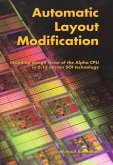Behavioral Synthesis: A Practical Guide to High-Level Design includes details on new material and new interpretations of old material with an emphasis on practical information. The intended audience is the ASIC (or high-end FPGA) designer who will be using behavioral synthesis, the manager who will be working with those designers, or the engineering student who is studying leading-edge design techniques.
Today's designs are creating tremendous pressures for digital designers. Not only must they compress more functionality onto a single IC, but this has to be done on shorter schedules to stay ahead in extremely competitive markets. To meet these opposing demands, designers must work at a new, higher level of abstraction to efficiently make the kind of architectural decisions that are critical to the success of today's complex designs. In other words, they must include behavioral design in their flow.
The biggest challenge to adopting behavioral design is changing the mindset of the designer. Instead of describing system functionality in great detail, the designer outlines the design in broader, more abstract terms. The ability to easily and efficiently consider multiple design alternatives over a wide range of cost and performance is an extremely persuasive reason to make this leap to a high level of abstraction. Designers that learn to think and work at the behavioral level will reap major benefits in the resultant quality of the final design.
But such changes in methodology are difficult to achieve rapidly. Education is essential to making this transition. Many designers will recall the difficulty transitioning from schematic-based design to RTL design. Designers that were new to the technology often felt that they had not been told enough about how synthesis worked and that they were not taught how to effectively write HDL code that would synthesize efficiently.
Using this unique book, a designer willunderstand what behavioral synthesis tools are doing (and why) and how to effectively describe their designs that they are appropriately synthesized.
CD ROM INCLUDED!
The accompanying CD-ROM contains the source code and test benches for the three case studies discussed in Chapters 14, 15 and 16.
Today's designs are creating tremendous pressures for digital designers. Not only must they compress more functionality onto a single IC, but this has to be done on shorter schedules to stay ahead in extremely competitive markets. To meet these opposing demands, designers must work at a new, higher level of abstraction to efficiently make the kind of architectural decisions that are critical to the success of today's complex designs. In other words, they must include behavioral design in their flow.
The biggest challenge to adopting behavioral design is changing the mindset of the designer. Instead of describing system functionality in great detail, the designer outlines the design in broader, more abstract terms. The ability to easily and efficiently consider multiple design alternatives over a wide range of cost and performance is an extremely persuasive reason to make this leap to a high level of abstraction. Designers that learn to think and work at the behavioral level will reap major benefits in the resultant quality of the final design.
But such changes in methodology are difficult to achieve rapidly. Education is essential to making this transition. Many designers will recall the difficulty transitioning from schematic-based design to RTL design. Designers that were new to the technology often felt that they had not been told enough about how synthesis worked and that they were not taught how to effectively write HDL code that would synthesize efficiently.
Using this unique book, a designer willunderstand what behavioral synthesis tools are doing (and why) and how to effectively describe their designs that they are appropriately synthesized.
CD ROM INCLUDED!
The accompanying CD-ROM contains the source code and test benches for the three case studies discussed in Chapters 14, 15 and 16.









